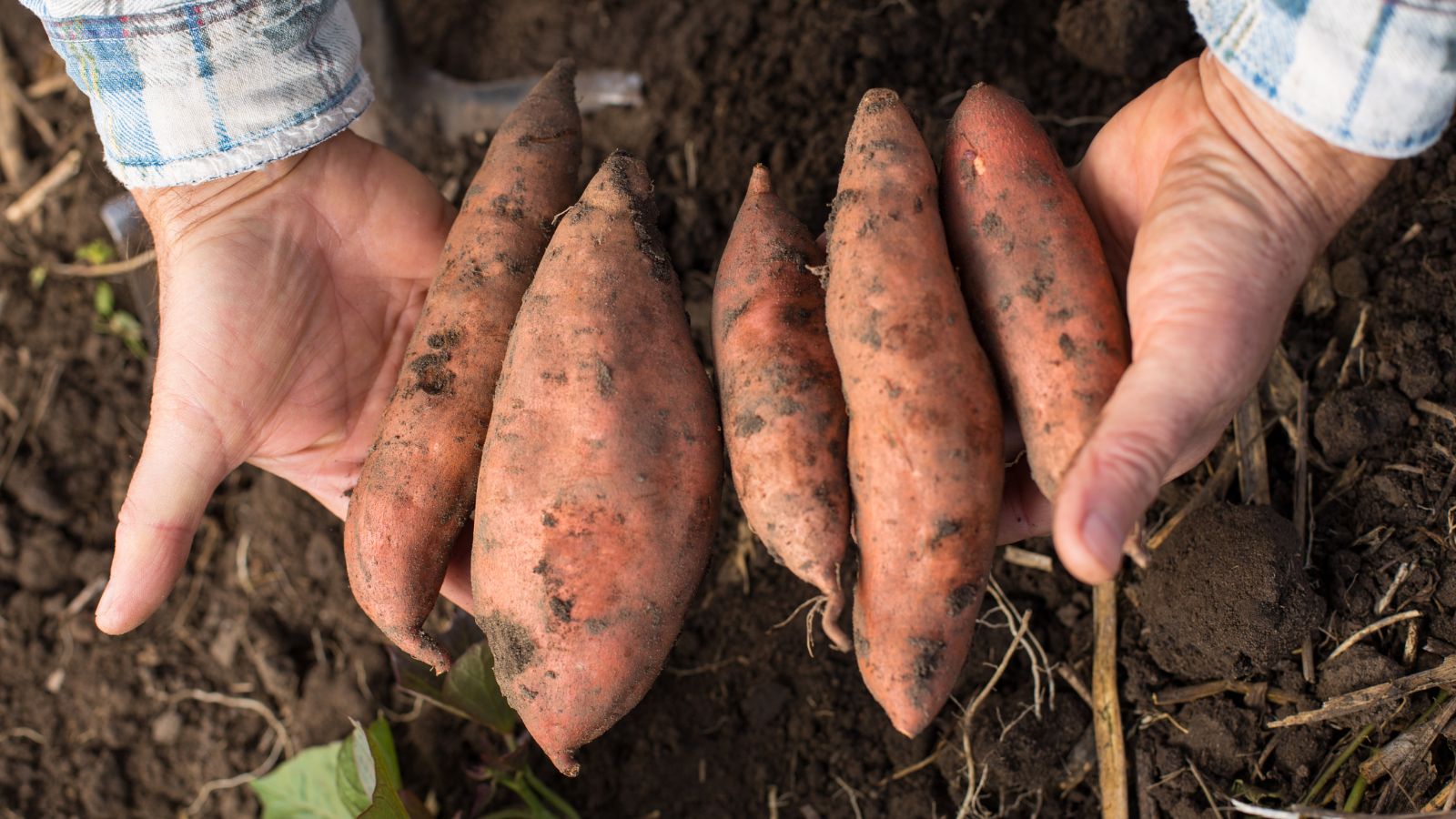
Are Sweet Potatoes Gluten Free? What You Need to Know Today
Photo Credit: Canva Pro
People who have celiac disease or are sensitive to gluten can eat sweet potatoes without worrying about any health problems. The reason sweet potatoes don't have gluten, how to eat them safely, and what other vegetables don't have gluten are all covered in this article.
We'll also talk about what happens when you stop eating gluten and show you some highly recommended FullyHealthy gluten-free products. Let's clearly and simply break it all down.
Are Sweet Potatoes Gluten Free?
Photo Credit: Canva Pro
Gluten-free people can eat sweet potatoes without worrying about getting celiac disease or other gluten-intolerance problems. These nutritious root vegetables don't have any wheat or other ingredients that contain gluten. Actually, sweet potatoes are safe by themselves, but how you cook them can make a big difference.
Yes, Sweet Potatoes Are Naturally Gluten-Free
There are no grains in sweet potatoes. Like other root vegetables, sweet potatoes are tuberous roots, not corms. That means they don't have gluten and are safe for people who don't eat gluten.
-
Naturally gluten-free: Sweet potatoes don’t contain wheat, rye, or barley, which are the main gluten sources.
-
Great for gluten-free meals: You can safely use them in mashed, baked, or roasted potato dishes.
-
Healthy swap: Use them instead of grain-based sides like pasta or bread.
Watch Out for Cross-Contamination When Cooking
You can make sweet potatoes unsafe if they come into contact with gluten while they are cooking, even though they don't contain gluten originally.
-
Shared tools: Using a baking sheet or knife that touches wheat flour or gluten containing ingredients can lead to cross contamination.
-
Seasoning blends: Some spice mixes or sauces may contain hidden gluten. Always check ingredient labels.
-
Restaurant risk: Be careful when ordering french fries—they’re often cross contamination in fryers used for breaded foods.
Can I Eat Sweet Potatoes on a Gluten-Free Diet?
Photo Credit: Canva Pro
Yes, and you should! Because they are high in fiber, vitamins, and minerals, sweet potatoes are a great choice for people who can't eat gluten. They're easy to make, taste great, and are always a family favorite.
Sweet Potatoes Support a Healthy Gluten-Free Diet
This brightly colored vegetable is good for you in many ways. It has a lot of good things for your body and not many bad fats.
-
Fiber-rich: Helps digestion and keeps you full longer.
-
Low in unhealthy fats: Which are considered less healthy. Contains small amounts of polyunsaturated fats, which are beneficial.
-
High in nutrients: Rich in beta-carotene (a precursor to vitamin A), potassium, and antioxidants.
-
Good for blood sugar: Sweet potatoes can have a lower glycemic index than some other starchy foods, especially when boiled.
Easy and Creative Gluten-Free Sweet Potato Meals
You can use sweet potatoes in a lot of different ways. There are only a few simple things you need to make them sweet or savory.
-
Oven-roasted fries: Slice and toss in olive oil, then bake on parchment paper in a preheated oven.
-
Mashed sweet potatoes: Boil and mix with butter for a creamy, gluten-free side.
-
Sweet bake: Add cinnamon and a little brown sugar for a naturally sweet treat.
-
Breakfast hash: Cook cubes in a large bowl over medium heat with peppers and eggs for a tasty start.
What Vegetables Are Gluten-Free?
Photo Credit: Canva Pro
You can eat a lot of vegetables without getting gluten, but you still need to watch how they're cooked. Vegetables don't have gluten by nature, but some preparation methods can add unwanted ingredients.
A List of Naturally Gluten-Free Vegetables
Vegetables make meals colorful and healthy even if you don't eat gluten.
-
Leafy greens: Spinach, kale, and Swiss chard are always gluten-free.
-
Starchy picks: Sweet potatoes, corn, squash, and other fresh potatoes are safe.
-
Everyday favorites: Onions, bell peppers, carrots, and mushrooms are also good to go.
-
Bonus: Most fruits, like apples and berries, are naturally gluten-free too.
Caution: How Vegetables Can Become Unsafe
Depending on how they're cooked or packed, vegetables can be safe or dangerous. Always check again.
-
Frozen or canned: These may come with sauces thickened with wheat flour or other gluten containing ingredients.
-
Pre-chopped mixes: Sometimes processed in facilities that also handle gluten—watch for cross contamination.
-
Added sauces: In stir-fries or stews, gluten can sneak in through soy sauce, gravy, or stock.
What Happens When You Stop Eating Gluten?
Photo Credit: Canva Pro
People with health problems like celiac disease or gluten sensitivity need to cut gluten out of their diet. But for some people, giving up gluten might not really be good for their health. It's important to know if gluten bothers you in order to make the right choice.
Who Should Actually Avoid Gluten
Not everyone has to stay away from gluten. It should be based on what's best for your health, not on what's popular.
-
Celiac disease: A serious autoimmune disorder that requires a strict gluten-free diet to avoid damage to the small intestine.
-
Gluten sensitivity: Some people feel better without gluten, though it doesn’t cause the same intestinal harm as celiac.
-
Wheat allergy: Gluten isn’t the issue, but wheat can cause allergic reactions.
-
Diet myths: Just because a food is labeled gluten-free doesn’t mean it’s healthier—it could still be a highly processed food.
Pros and Cons of a Gluten-Free Diet
There are some good things about going gluten-free, but there are also some bad things, especially if you don't have to.
-
Loss of fiber and nutrients: Many gluten-free diets cut out whole grains, which are a great source of fiber, iron, and B vitamins.
-
More planning required: Meals may take longer to prepare, increasing your prep time.
-
Digestive relief: People with sensitivity often feel less bloated and tired after cutting gluten.
-
Check everything: Always review recipe steps and product labels for hidden gluten sources.
What Can FullyHealthy Do for Gluten-Free Shoppers?
FullyHealthy has all the gluten-free products you need in one place. People who want to avoid gluten can still eat tasty, safe foods without having to guess what's in them.
Gluten-Free Products Available on FullyHealthy
This store carefully chooses its foods to meet the needs of people with strict diets. It has clean-label, high-quality food for every meal.
-
Sweet potato options: From orange flesh canned sweet potatoes to avocado oil chips.
-
Baking made easy: Gluten-free mixture packs for cookies, brownies, and bread.
-
Clean ingredients: Natural sweeteners like maple and coconut sugar—no junk.
-
Tasty snacks: Safe seasonings and snack packs that are both convenient and delicious.
Why FullyHealthy Is a Trusted Source for Special Diets
It's easy to shop on this site for gluten-free items. Safe, tasty, and easy to make food is easy to come by.
-
Clear labels: Everything is marked by diet type to avoid confusion.
-
No subscription needed: Buy when you want, without pressure.
-
Easy prep: Most items need only basic things like water or salt to prepare.
-
Flavor and texture: Customers love the taste, soft texture, and tender results of their favorite products.
Final Thoughts
People who can't have gluten should eat sweet potatoes. They're naturally gluten-free, good for you, and can be used in a lot of simple recipes. For a crispy side, peel and roast them. For a protein-rich topping, mash them.
Just remember to read labels, ingredients, and cooking tools to make sure gluten doesn't get in. If you want to shop quickly and safely, sites like FullyHealthy make it easy. All you have to do is add your favorite flavors and enjoy.
FAQs
Are sweet potatoes gluten-free with peel on?
Yes, sweet potatoes are still gluten-free even if you peel or leave the skin on. Just make sure there's no cross contamination during prep.
Do sweet potatoes have protein?
Sweet potatoes are not a major source of protein, but they do contain a small amount—about 2 grams per medium potato.
How can I make sweet potatoes crisp in the oven?
To get that perfect crisp texture, slice thin, toss with olive oil, and sprinkle with salt. Bake on parchment paper in a hot oven for best results.
Are there nutritional benefits to eating sweet potatoes?
Yes, sweet potatoes are rich in fiber, vitamin A, and other nutritional benefits. They support digestion and are great for a gluten-free diet.
Can I sprinkle protein on sweet potatoes?
Yes, you can sprinkle nuts, seeds, or even protein powder on baked sweet potatoes for added protein and flavor.

Leave a comment